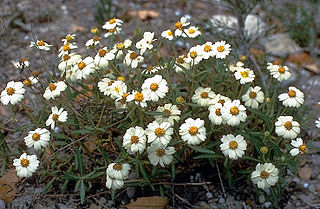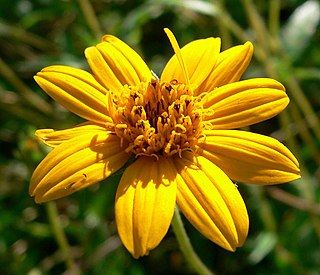Harold Ernest Robinson was an American botanist and an entomologist.

Melampodium is a genus of flowering plants in the sunflower family.

The Heliantheae are the third-largest tribe in the sunflower family (Asteraceae). With some 190 genera and nearly 2500 recognized species, only the tribes Senecioneae and Astereae are larger. The name is derived from the genus Helianthus, which is Greek for sun flower. Most genera and species are found in North America and South America. A few genera are pantropical.

Tageteae is a tribe of the plant family Asteraceae. It consists of approximately 260 species divided among 32 genera. All are found in the New World, with a center of diversity in the Mexican highlands. The type genus is Tagetes (marigolds).

Thymophylla is a genus of perennial flowering plants in the tribe Tageteae within the family Asteraceae. Pricklyleaf is a common name for plants in this genus.
Oblivia is a genus of flowering plant in the tribe Heliantheae within the family Asteraceae.
Pappobolus is a genus of flowering plant in the family Asteraceae native to the Andes Mountains of Colombia, Ecuador, and Peru.

Wedelia is a genus of flowering plants in the family Asteraceae. They are one of the genera commonly called "creeping-oxeyes".

The Cichorieae are a tribe in the plant family Asteraceae that includes 93 genera, more than 1,600 sexually reproductive species and more than 7,000 apomictic species. They are found primarily in temperate regions of the Eastern Hemisphere. Cichorieae all have milky latex and flowerheads that only contain one type of floret. The genera Gundelia and Warionia only have disk florets, while all other genera only have ligulate florets. The genera that contain most species are Taraxacum with about 1,600 apomictic species, Hieracium with about 770 sexually reproducing and 5,200 apomictic species, and Pilosella with 110 sexually reproducing and 700 apomictic species. Well-known members include lettuce, chicory, dandelion, and salsify.
Tetrachyron is a genus of Mesoamerican plants in the sunflower tribe within the daisy family.
Damnxanthodium is a monotypic genus of flowering plants in the family Asteraceae, containing the single species Damnxanthodium calvum. It is native to northern Mexico.

Zexmenia is a genus of Latin American plants in the tribe Heliantheae within the family Asteraceae.

Simsia is a genus of flowering plants in the tribe Heliantheae within the family Asteraceae. It includes annuals, herbaceous perennials, and shrubs. They range from the western United States south through Central and South America to Argentina, with the center of diversity occurring in Mexico. The genus is named for British physician and botanist John Sims (1749–1831). Although some species are relatively rare, others have become common weeds that line the roadsides and fields of Mexico, often forming dense stands mixed with Tithonia and other Asteraceae. Some species are known by the common name bushsunflower.
Iogeton is a monotypic genus of flowering plants in the family Asteraceae.

Iostephane is a genus of Mexican flowering plants in the family Asteraceae.
Jefea is a genus of North American flowering plants in the family Asteraceae, native to Mexico and the southwestern United States. These are shrubs up to 200 cm tall, with yellow or orange flower heads containing both ray and disc flowers.

Lipochaeta, common name nehe, is a genus of flowering plants in the family Asteraceae that is endemic to Hawaii.
Lundellianthus is a genus of Mesoamerican flowering plants in the tribe Heliantheae within the family Asteraceae.

Wedelia acapulcensis, commonly known as Acapulco wedelia, is a species of flowering plant in the family Asteraceae. It is native to Texas in the United States, Mexico, and Central America.
Tuxtla is a genus of Mesoamerican flowering plants, in the family Asteraceae.









